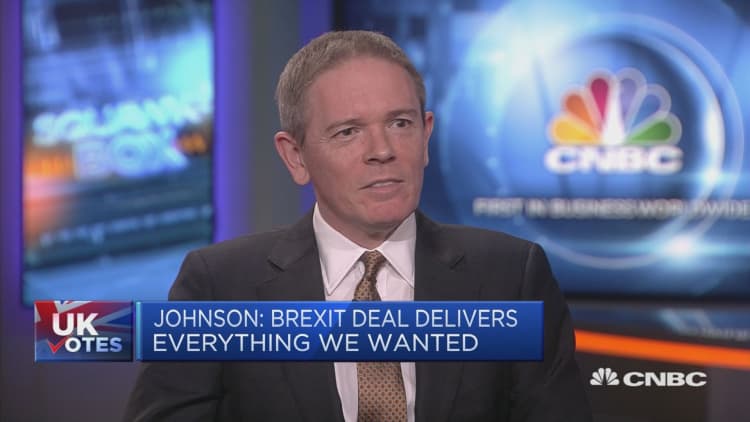The British electorate faces a "terrible choice" at the ballot box next month, according to the chief economist at Pantheon Macroeconomics.
His comments come shortly after the leaders of Britain's two biggest political parties clashed in their first televised debate of the election campaign on Tuesday evening.
Prime Minister Boris Johnson vowed to end ongoing "national misery" by delivering Brexit by the end of January.
The Conservative Party leader, who had previously promised to deliver Brexit "do or die, come what may" by the end of October, sought to reinforce a pledge that his party would be able to resolve the Brexit crisis quickly, saying his government had a divorce deal that is "oven-ready."
In contrast, Jeremy Corbyn, leader of the opposition Labour party, said he would "get Brexit sorted by giving you, the people, the final say."
Labour wants to negotiate a new deal with the European Union, with a customs union and a closer relationship with the single market. Corbyn has said this deal would be put to a public vote, with citizens choosing either to leave on Labour's terms or to remain.
Corbyn, who was asked nine times by Johnson to say whether his party would then campaign to stay in the bloc or leave, said he would respect the decision of the people.

Ian Shepherdson, chief economist at Pantheon Macroeconomics, told CNBC's "Squawk Box Europe" on Wednesday that the televised debate between Johnson and Corbyn had been "disappointing."
"It is a terrible choice," Shepherdson said, before adding: "Two dreadful, inadequate, dissembling, incompetent politicians and one of them is definitely going to be prime minister."
The Conservative Party and Labour party were not immediately available to comment when contacted by CNBC on Wednesday morning.
A snap YouGov poll indicated the British public was evenly split on who performed best during the election debate, with most Labour voters suggesting Corbyn had won and most Conservative voters thinking Johnson had come out on top.
On December 12, Britons will head to the ballot box for the country's first pre-Christmas election in almost a century.
It could decide both the fate of the U.K.'s departure from the European Union and the future of the world's fifth-largest economy.
'Not a very nuanced conversation'
In a wide-ranging debate televised on ITV on Tuesday evening, Johnson and Corbyn clashed on several issues, including the National Health Service (NHS), the future of Scotland and the royal family.
The latest opinion polls put Johnson's center-right Conservatives roughly 12 points ahead of Corbyn's left-wing Labour party.
In an attempt to attract weary voters, the leaders of the two major national parties went on the attack. Both sought to try to land a decisive blow, with Johnson seeking to portray his political rival as indecisive, while Corbyn questioned whether voters could trust the sitting prime minister.
In one particularly fiery exchange, the Labour leader claimed that if the Conservatives return to power next month, U.S. health firms would be given "full market access" to the state-run National Health Service in a post-Brexit trade deal.
Holding up documents appearing to show redacted accounts of a "series of secret meetings" with U.S. officials, Corbyn told the prime minister: "You are going to sell our National Health Service out to the United States and Big Pharma."
Johnson said Corbyn's claims were "an absolute invention" and insisted a Conservative-led government would not put the NHS on the table in any trade talks.
"I think it sounds crazy that somehow the National Health Service is going to be the focal point of this trade negotiation," Clete Willems, a former Trump administration trade official and partner at Akin Gump, told CNBC on Wednesday.
"I watched the debate with great interest last night and I thought that was not a very nuanced conversation."
"The U.S. does not expect it is going to revolutionize the NHS as part of a trade deal, absolutely not," Willems said.
When asked whether U.S. pharmaceutical firms would want to sell drugs at a higher price in a future Free Trade Agreement (FTA) with the U.K., Willems replied: "In general, absolutely."
"Our pharmaceutical companies are interested in doing that around the world but that doesn't mean that is going to be something that we achieve in an FTA (Free Trade Agreement)."


